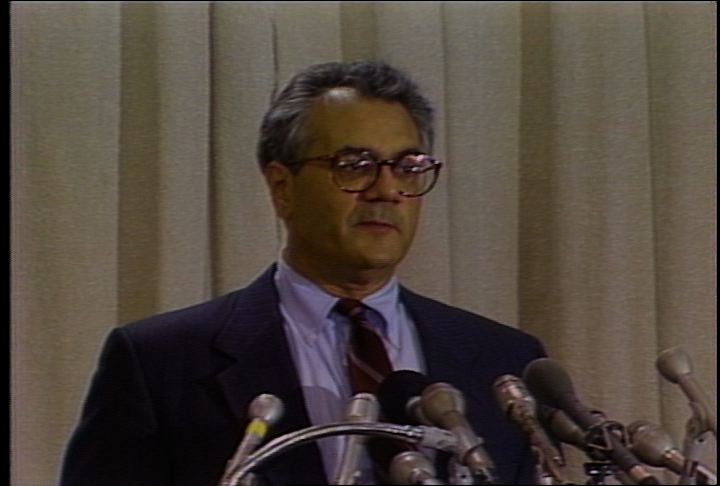
Description:
Deborah Wang reports that the city of Boston's minority set-aside program is facing a court challenge. This program allows minority-owned businesses to break into their industries by inviting them to participate in municipal projects. Interview with Robert McCoy pf McCoy Landscaping, who says that his business could not have survived without the program. The Consortium of Minority Business Enterprises has been formed to protect set-aside laws in Massachusetts. Interview with Walter Williams of the Contractors' Association of Boston, about the set-aside programs. The Consortium gave a hostile reception to Sen. John Kerry at a recent meeting, where he says that public opinion is not in favor of set-aside programs. Wang notes that Consortium members seem to be united in support of set-aside programs. This edition of the Ten O'Clock News also included the following item: Press conference to celebrate the positive findings of a study on the state's Healthy Start Program
1:00:08: Visual: Footage of construction workers digging holes for the construction of a new park in Roxbury. Deborah Wang reports that the new Roxbury park is a $400,000 project which has been funded by the city of Boston. Wang reports that the work is being done by McCoy Landscapers; that McCoy Landscapers may not have had an opportunity to do the job five years ago. V: Footage of Robert McCoy (McCoy Landscaping) being interviewed by Wang at the park site. McCoy says that the minority set-aside program has allowed him to build his business; that he could not have survived without the program. Wang reports that McCoy says that minority firms often have a hard time getting their bids accepted by contractors. V: Shots of construction workers digging holes at the Roxbury park site. Footage of McCoy saying that most contractors want to work with firms with which they are familiar. McCoy says that the minority set-aside program has allowed his company to break into the business. Wang reports that the minority set-aside program has been threatened by a Supreme Court decision; that Boston's set-aside program is facing a court challenge. Wang reports that minority business owners say that their businesses will be devastated if the program is shut down. V: Shot of workers digging and measuring holes at the Roxbury site. Footage of a meeting held by the Consortium of Minority Business Enterprises. Shot of a banner for the Contractors' Association of Boston, which hangs on a wall of the meeting room. Shots of the media and audience members at the meeting. Wang reports that the Consortium of Minority Business Enterprises has been formed to protect set-aside laws in Massachusetts. V: Footage of Walter Williams (Contractors' Association of Boston) being interviewed by Wang. Williams says that minority-owned businesses will be fighting with white-owned businesses for opportunities. Wang reports that members of the Consortium of Minority Business Enterprises gave a hostile reception to John Kerry (US Senator). Wang notes that Kerry has been a long-time supporter of set-aside programs. Wang reports that Kerry told the Consortium that public opinion is against them. V: Footage of Kerry at the Consortium meeting. Kerry says that Irish immigrants, Italian immigrants, and immigrants of other nationalities struggled to succeed without affirmative action programs when they arrived in the US. A Consortium member tells Kerry that he does not care if the Consortium offends other groups. Kerry tells the Consortium that he is trying to describe the feelings of other groups toward affirmative action programs; that the Consortium needs to decide whether or not to take these feelings into account. Kerry says that there will be trouble if the Consortium does not care about the feelings of other groups. Shots of Consortium members attending the meeting, including Deval Patrick (attorney). Wang reports that the Consortium needs to decide whether it will compromise; that members took a hard line at today's meeting. V: Footage of McCoy being interviewed by Wang at the Roxbury park site. saying that the Consortium will probably offend some groups with its actions; that the civil rights movement offended some people. McCoy says that the Consortium will not change its position.
Date Created:
05/15/1989














